(Translation from the website of the German Shuffleboard Association e.V.)
Click here for all pictures
Two European Champions from Germany
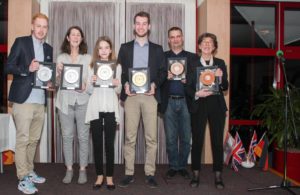 The German Shuffleboard Association (GSA) took home five out of six medals up for grabs at the First European Championship in Hohenroda, Hessen, Germany. A total of 48 players from England, Norway, Austria and Germany competed to crown the best shufflers of Europe for the first time.
The German Shuffleboard Association (GSA) took home five out of six medals up for grabs at the First European Championship in Hohenroda, Hessen, Germany. A total of 48 players from England, Norway, Austria and Germany competed to crown the best shufflers of Europe for the first time.
The women’s competition was won by 12-year old Fabienne Fluck from Germany, who played a sensational final game against the previously undefeated Ina Schwarten (GER). Third place went to Lille Nielsen-Berg from Norway who prevailed against Irene Hoffmanns (GER).
The men’s competition was dominated by German shufflers. In a thrilling finale, Torben Hußmann from Germany defeated a very strong Marius Runge (GER), thus maintaining his clean record of zero losses and winning the European men’s title. Bronze went to Hubert Fluck (GER) who beat GSA-President Dieter Hußmann (GER).
The top 10 of both the women’s and men’s competition counted numerous other GSA-players, making the first European Championship a great success from the German perspective.
Preparations by the Organization Team
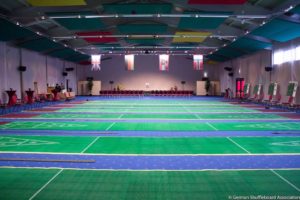 The Organization Team around the GSA President, Chief Executive and Treasurer, including supporters Ina Schwarten, Hannah Schweiger, Marius Runge and Torben Hußmann, arrived in Hohenroda, Germany, on Wednesday before the event to make the necessary arrangements. Eight courts as well as the accompanying equipment had to be transported, set up and adjusted accordingly. The venue and stage itself required additional preparations, so flags and flower decorations were installed to create a worthy ambiance. The picture was completed by a collaboration between the Runge family and Hubert Fluck, who designed and printed stylish EM logos which were displayed in different variations throughout the hotel area.
The Organization Team around the GSA President, Chief Executive and Treasurer, including supporters Ina Schwarten, Hannah Schweiger, Marius Runge and Torben Hußmann, arrived in Hohenroda, Germany, on Wednesday before the event to make the necessary arrangements. Eight courts as well as the accompanying equipment had to be transported, set up and adjusted accordingly. The venue and stage itself required additional preparations, so flags and flower decorations were installed to create a worthy ambiance. The picture was completed by a collaboration between the Runge family and Hubert Fluck, who designed and printed stylish EM logos which were displayed in different variations throughout the hotel area.
Webmaster and IT specialist Oliver Schwarten had been working hard on the website in order to present the shufflers, audience and international community with an impressive, multi-layered online result table. The well-equipped venue allowed Oliver to update the results in real-time, thereby delivering match results and current rankings to all of the participants themselves as well as the fans at home.
Practice Day and “Meet n’ Greet”
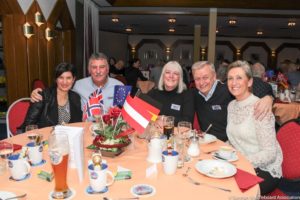 The Thursday before the official start to the Championship was devoted to the reception of the guests and practice. In the early morning, a delegation of the GSA went to Frankfurt Main airport to welcome the international shuffleboard players. While Norwegian and Austrian players arrived before midday, the GSA delegation welcoming the UK team had to wait until the afternoon. Regardless, all guests enjoyed a glass of champagne that helped shorten the two hour bus ride to the hotel in Hohenroda.
The Thursday before the official start to the Championship was devoted to the reception of the guests and practice. In the early morning, a delegation of the GSA went to Frankfurt Main airport to welcome the international shuffleboard players. While Norwegian and Austrian players arrived before midday, the GSA delegation welcoming the UK team had to wait until the afternoon. Regardless, all guests enjoyed a glass of champagne that helped shorten the two hour bus ride to the hotel in Hohenroda.
Thanks to Ina Schwarten’s welcome counter, the check-in at the hotel took mere minutes, so that the majority of the participants was on the courts for practice by 3pm. Among the international crowd was the president of the recently founded Austrian Shuffleboard Association, Peter Krappel. As it was his first time on the European shuffleboard stage, he gathered valuable intel on strategy and tactics from the subsequent men’s European Champion. The implementation of the new tips proved successful, as Krappel would later place himself among the Top 16 of the tournament.
Later in the evening, the „Meet n‘ Greet“ proved the perfect occasion for both happy reunions and forming new friendships. Although the majority of the shufflers had previously met on numerous other occasions, such as International friendly matches or World Championships, the new players fit right in and the ties between the competing nations were extended. Then tournament director Dieter Hußmann announced the tournament groups.
The strengths and weaknesses of the individual groups were the hot topic of many of the conversations taking place during the subsequent dinner. The tables at the restaurant were beautifully decorated by the team around Birgitt Hußmann and the Fluck family and each was furnished with a small welcome gift for the participants. The organizational team sat players from different countries together at each table, creating a real international atmosphere. That atmosphere also carried the shufflers into the night, as many came together again at the „History“ bar where the day drew to a close.
Opening ceremony
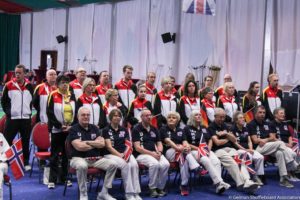 Early on Friday morning, all shufflers gathered to celebrate at the official opening ceremony. The participants ceremoniously entered the venue with smiles on their faces and waving their individual country‘s flags. Once everyone was seated, the national anthems were played.
Early on Friday morning, all shufflers gathered to celebrate at the official opening ceremony. The participants ceremoniously entered the venue with smiles on their faces and waving their individual country‘s flags. Once everyone was seated, the national anthems were played.
Before the games could officially begin, the shufflers received a comprehensive briefing regarding the tournament procedures as well as the rules.
The tournament
In both the women’s and men’s competition, shufflers were divided into four groups of six participants each. The organizers arranged the groups with due diligence, creating homogeneity regarding playing abilities on the one hand and variety of country of origin on the other.
During the preliminary round which was played as “Round Robin”, the top four shufflers from each group qualified to advance to the round of 16. Shufflers placing fifth or sixth in their group played for ranks 17 to 24.
In group A, the best German women’s player Irene Hoffmanns faced Renate Hirning. Anne-Lise Flatland and Beate Wilhelmsen (NOR) as well as Lesley Davis and Brenda Wanger (UK) completed the group. Irene Hoffmanns (GER) finished third with three wins, while Renate Hirning (GER) won all of her five games, thus finishing first in group A.
In group B, the leading lady of the European ranking, Kristin Gjelseth (NOR), was a definite front-runner. The group was completed by Ann-Kristin Hellerslien (NOR) and Diane Smith (UK), as well as three German ladies, namely Andrea Büchner-Ott, Rosi Dastis and Fabienne Fluck, the most senior and the youngest player . At only 12 years old, the latter surprisingly placed first in her group with four wins. Her only loss was against Rosi Dastis (GER). Favorite Kristin Gjelseth (NOR) also scored four wins, but lost to Fabienne Fluck (GER) in a one-on-one match for first place. Andrea Büchner-Ott (GER) and Ann-Kristin Hellerslien (NOR) placed third and fourth, respectively, thus advancing to the round of 16.
In group C, four out of the six shufflers counted three wins each at the end of the first Round Robin. Hannah Schweiger and Kerstin Runge (both GER) had the better score, therefore taking first and second place. They were followed by Lille Nielsen-Berg and Louise „Lulu“ Bye (both NOR). Unfortunately, Sabine Harms (GER) could not qualify for the round of 16 despite her great performance. She ranked fifth, ahead of Sandy Harding (UK).
In group D, results were more clear-cut. Ina Schwarten (GER) amassed five wins and finished first in her group, followed by Ellen Hansson (NOR) and Cathy Seaman (UK). In fourth place, Ulla Voltin (GER) also qualified for the round of 16 with two wins. Marianne Stiegen (GER) scored one victory which was unfortunately not enough to advance. However, both Marianne Stiegen (GER) and Monica Jansen (NOR) who placed sixth continued in high spirits to play for the ranks 17 to 24.
In group A of the men’s competition, leader of the European ranking Torben Hußmann (GER) was the favorite. He cemented his status by scoring five wins, finishing first in his group. Martin Wanger (UK) won three of his games and thus finished second. Johnny Wilhelmsen (NOR) and Peter Krappel (AUT) were tied after their regular games and also tied during their one-on-one match, placing third and fourth. Unfortunately, two wins were not enough for either Pal Gjelseth (NOR) or Oliver Schwarten (GER) to advance.
In group B, Dieter Hoffmanns, Marius Runge, Hubert Fluck (all GER) and Olav Hansson (NOR) held the upper hand. Due to the win against Olav Hansson, Marius Runge (GER) placed first in his group, followed by Olav Hansson (NOR), Hubert Fluck (GER) and Dieter Hoffmanns (GER). Sadly, John Harding (UK) and Terje Hanssen-Tangen (NOR) were not able to secure their spots in the round of 16.
In group C, Bernd Uhl and Rolf Kissmann (both GER) secured ranks two and four, respectively, thus qualifying for the round of 16. Petter Nielsen-Berg and Arnfinn Berg (NOR) also advanced, placing first and thrid, respectively. Bob Smith and Peter Davis (both UK) moved on to compete for ranks 17 to 24.
In group D, three German top 10 players competed for the group title: Sebastian Runge, Jürgen „Yogi“ Engler and Dieter Hußmann. One of the best Norwegian players Hallvard Flatland, as well as Petter Jörgensen (also NOR) and Trevor Seaman (UK) completed group D. In the end, Petter Jörgensen (NOR) and Yogi Engler (GER) placed fifth and sixth, while first place went to Hallvard Flatland (NOR), followed by Sebastian Runge (GER), Trevor Seaman (UK) and Dieter Hußmann (GER).
Later that day, the above results proved to be the main topic of conversation during a joint dinner at the hotel.
Saturday – Finals
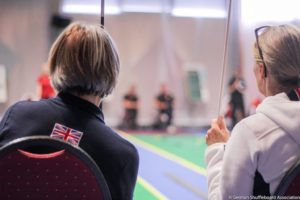 In the round of 16, the group winners faced off against players finishing fourth in their neighbouring group, while second rank played against third rank of another group.
In the round of 16, the group winners faced off against players finishing fourth in their neighbouring group, while second rank played against third rank of another group.
At the same time, the matches for rank 17 to 24 took place, where all shufflers had the opportunity to rack up more achievements. Marianne Stiegen (GER) ultimately counted three wins and took rank 17. Sabine Harms (GER) placed 19th, while Rosi Dastis (GER) finished 20th, thus cementing the great results for the GSA players.
For the men, Oliver Schwarten (GER) and „Yogi“ Engler (GER) secured ranks 19 and 20.
A total of eight German women qualified fort he round of 16. Here, the previously undefeated Renate Hirning (GER) had to register her first loss of the tournament against Ann-Kristin Hellerslien (NOR). She then played for ranks nine to 16; as did Ulla Voltin (GER) who lost to Hannah Schweiger (GER).
Ina Schwarten (GER) narrowly beat Louise Bye (NOR) and Andrea-Büchner-Ott scored a surprising victory against a strong Anne-Lise Flatland (NOR). Fabienne Fluck (GER) defeated Beate Wilhelmsen (NOR), Kerstin Runge (GER) won against Cathy Seaman (UK) and Irene Hoffmanns had the upper hand against Kristin Gjelseth (NOR). In the end, six out of eight German women were able to advance to the quarter finals, a great success for the GSA.
The men’s competition also counted eight German shufflers. Only Dieter Hoffmanns (GER) came out short when he lost to Torben Hußmann (GER). The surprise of the day was delivered by Rolf Kissmann (GER), who kept Hallvard Flatland (NOR) at a 70 point difference until the end of his match. Sebastian Runge (GER) won his game against Arnfinn Berg (NOR), Hubert Fluck (GER) was victorious against Martin Wanger (UK), Marius Runge (GER) beat Peter Krappel (AUT), Bernd Uhl (GER) proved superior to Trevor Seaman (UK) and Dieter Hußmann defeated Petter Nielsen-Berg. Thus, seven German men advanced to the quarter finals.
As a consequence, three matches in the quarter finals were between GSA shufflers. Here, Torben Hußmann (GER) had the upper hand against Sebastian Runge (GER), Hubert Fluck (GER) beat Rolf Kissmann (GER) and Marius Runge (GER) defeated Bernd Uhl (GER). The only non-GSA player Olav Hansson (NOR) unfortunately lost to Dieter Hußmann (GER).
In terms of German success, the women’s quarter finals produced similar results. Ina Schwarten (GER) beat Andrea Büchner-Ott (GER), Fabienne Fluck (GER) won against Kerstin Runge (GER) and Irene Hoffmanns (GER) defeated Hannah Schweiger (GER). The only Norwegian to advance was Lille Nielsen-Berger, who proved superior to Ann- Kristin Hellerslien (NOR).
The games for rank nine to 16 were dominated by Kristin Gjelseth (NOR) who ranked ninth, followed by Renate Hirning (GER), whose victory secured her a spot among the Top 10 of Europe. Ulla Voltin ranked 15th.
In the men’s competition, Dieter Hoffmanns ranked 13th, while the only Austrian to compete, Peter Krappel ultimately ranked 16th. At this point, we would like to congratulate him to his great first performance on the international stage and hope to hear and see more from the Austrian Shuffleboard Association in the future.
The men’s semifinals featured two German shufflers, Torben Hußmann and Hubert Fluck. The latter had to concede a defeat, while Torben Hußmann advanced to the finals.
The second men’s semifinal also saw two GSA shufflers. Marius Runge maintained the upper hand against Dieter Hußmann and joined the latter’s son in the finals.
For the women, Ina Schwarten (GER) continued her winning streak, this time against Lille Nielsen-Berg (NOR). Fabienne Fluck (GER) had a difficult time against Irene Hoffmanns (GER) in a dramatic game, but ultimately proved victorious and advanced to the finals against Ina Schwarten (GER).
In the meantime, the candidates for ranks five to eight had solidified. Rank five went to Hannah Schweiger (GER), followed by Andrea Büchner-Ott (GER), Kerstin Runge (GER) and Ann-Kristian Hellerslien (NOR).
Rank five for the men went to Sebastian Runge (GER), followed by Bernd Uhl (GER), Olav Hansson (NOR) and Rolf Kissmann (GER).
In the „small finale“ Hubert Fluck (GER) beat Dieter Hußmann (GER) and secured his bronze medal. Lille Nielsen-Berg (NOR) defeated Irene Hoffmanns, winning bronze for the women.
The finals exceeded all expectations. Until the very last disk, the matches remained undecided and full of suspense.
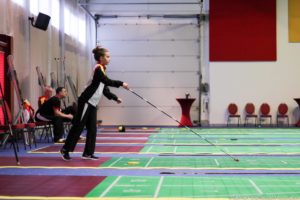 With a 14:12 victory, Fabienne Fluck (GER) secured the gold medal ahead of the previously undefeated Ina Schwarten (GER), who won silver. The former successfully implemented a „Clear the Board“ strategy and thus prevented her competitor from scoring. Winning the title at only 12 years old is certainly an exceptional experience that is unlikely to be replicated any time soon.
With a 14:12 victory, Fabienne Fluck (GER) secured the gold medal ahead of the previously undefeated Ina Schwarten (GER), who won silver. The former successfully implemented a „Clear the Board“ strategy and thus prevented her competitor from scoring. Winning the title at only 12 years old is certainly an exceptional experience that is unlikely to be replicated any time soon.
With a 24:16 victory, Torben Hußmann (GER) narrowly took home the gold medal ahead of Marius Runge (GER).
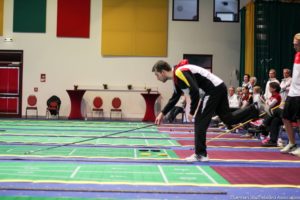 With his last shot, the latter had the opportunity to turn the game in his favor. However, he would have had to score 10 points although the field was blocked by his opponent’s disc. Unfortunately for Marius Runge, he missed, thus the game ended Torben Hußmann’s favor.
With his last shot, the latter had the opportunity to turn the game in his favor. However, he would have had to score 10 points although the field was blocked by his opponent’s disc. Unfortunately for Marius Runge, he missed, thus the game ended Torben Hußmann’s favor.
After these intense and emotional final games, the medal-winners were overwhelmed by congratulations from all sides.
Thus the First European Shuffleboard Championship drew to a close and all protagonists looked forward to the Award Ceremony during the Gala-Dinner that took place the same night.
Gala-Dinner and Award Ceremony
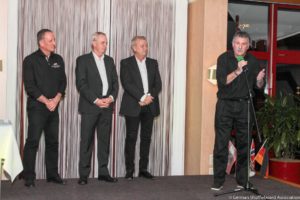 The Award Ceremony took place in the hotel restaurant, which had been decorated to match the festivities. Prior to the official ceremony, the organizers had invited all shufflers to celebrate with a few drinks at the hotel bar.
The Award Ceremony took place in the hotel restaurant, which had been decorated to match the festivities. Prior to the official ceremony, the organizers had invited all shufflers to celebrate with a few drinks at the hotel bar.
Before the „menu of nations“ was served, shufflers and guests enjoyed an aperitif along with the sensational musical performance by a sax player. He had previously been hired for the World Championships in Germany in 2010. Today, he is one of the best saxophonists in Germany. The effects of his music were evident immediately, as shufflers and guests followed the example of Petter Nielsen-Berg and came together to dance.
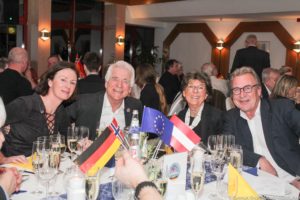 After the meal, the Award Ceremony took place. The three best players from the women’s and men’s competitions each received a disc, painted either gold, silver, or bronze. General Secretary of the GSA Oliver Schwarten had a funny surprise for treasurer Birgitt Hußmann, who had symbolically opened every tournament round by hitting a bell. To the amusement of the shufflers and guests, Oliver had created a certificate rewarding her actions that he then ceremoniously presented. Afterwards, each shuffler received their own participation and ranking certificate, awarded by their respective national president Hallvard Flatfland (NOR), Peter Davis (UK), Peter Krappel (AUT) or Dieter Hußmann (GER).
After the meal, the Award Ceremony took place. The three best players from the women’s and men’s competitions each received a disc, painted either gold, silver, or bronze. General Secretary of the GSA Oliver Schwarten had a funny surprise for treasurer Birgitt Hußmann, who had symbolically opened every tournament round by hitting a bell. To the amusement of the shufflers and guests, Oliver had created a certificate rewarding her actions that he then ceremoniously presented. Afterwards, each shuffler received their own participation and ranking certificate, awarded by their respective national president Hallvard Flatfland (NOR), Peter Davis (UK), Peter Krappel (AUT) or Dieter Hußmann (GER).
The tournament winners received standing ovations and beamed with joy as they received their awards. Torben Hußmann seized the opportunity to hold an emotional acceptance speech.
Then, shufflers and guests prepared for their departures. The organization team of the GSA had to dismantle and pack the equipment before it could be transported from the venue. Thanks to the help of other shufflers, this task was accomplished before midday.
The GSA would hereby like to thank the hotel and its staff for their amazing and special services. The participants and guests all enjoyed themselves and are looking forward to the Second European Shuffleboard Championships in 2019.
The GSA would especially like to thank all of its guests and members who have contributed to the great success of this event.
We are happy and proud to congratulate our young shufflers to their European titles and wish them all the best for their future.



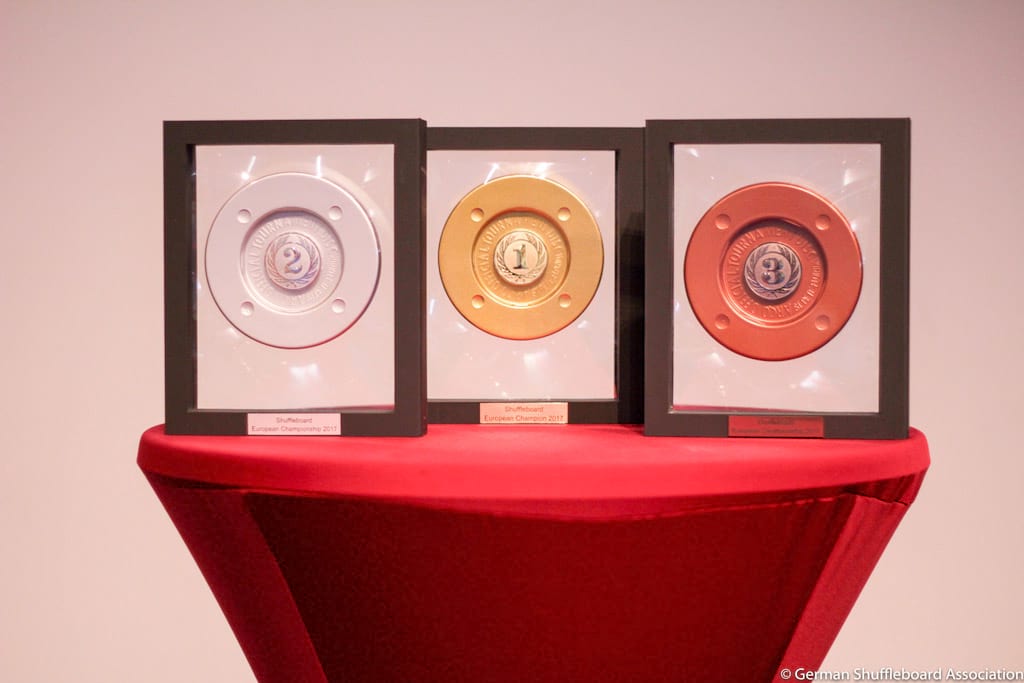
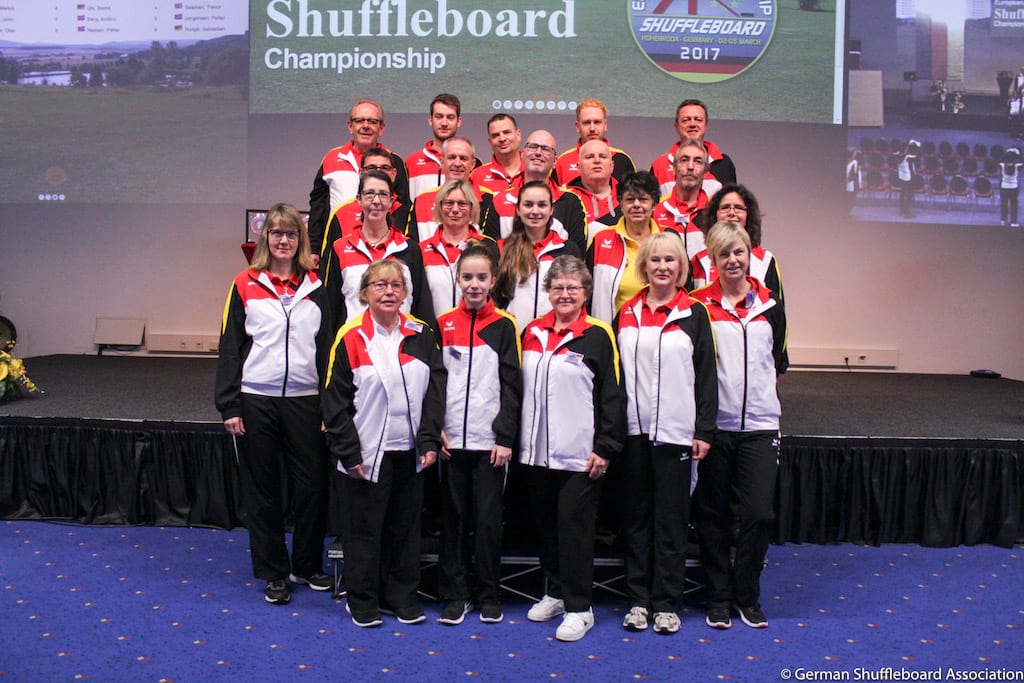
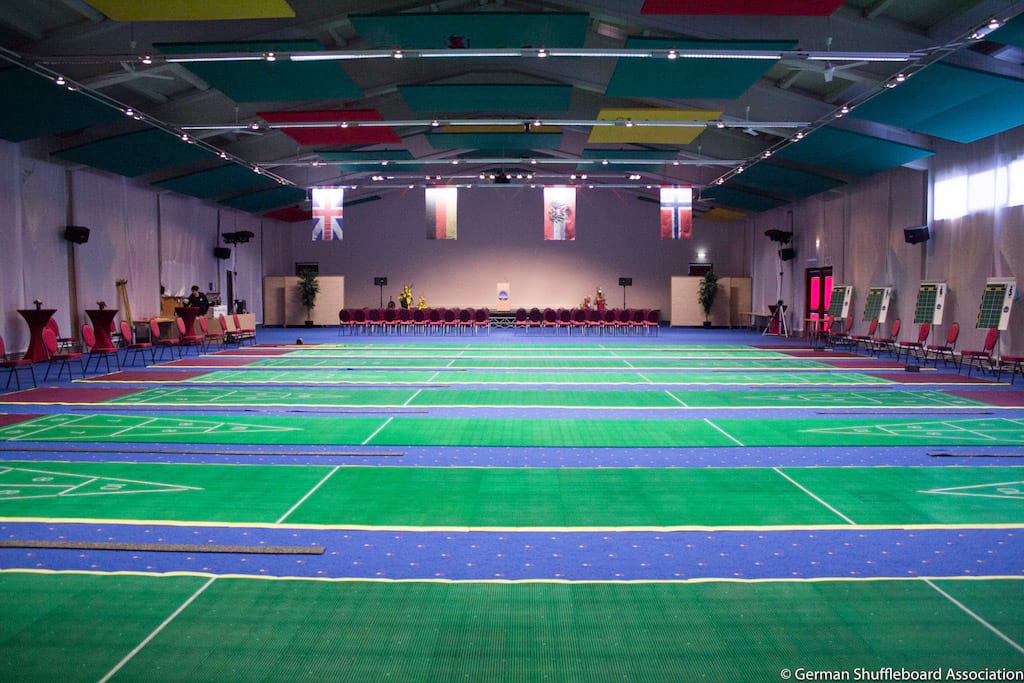
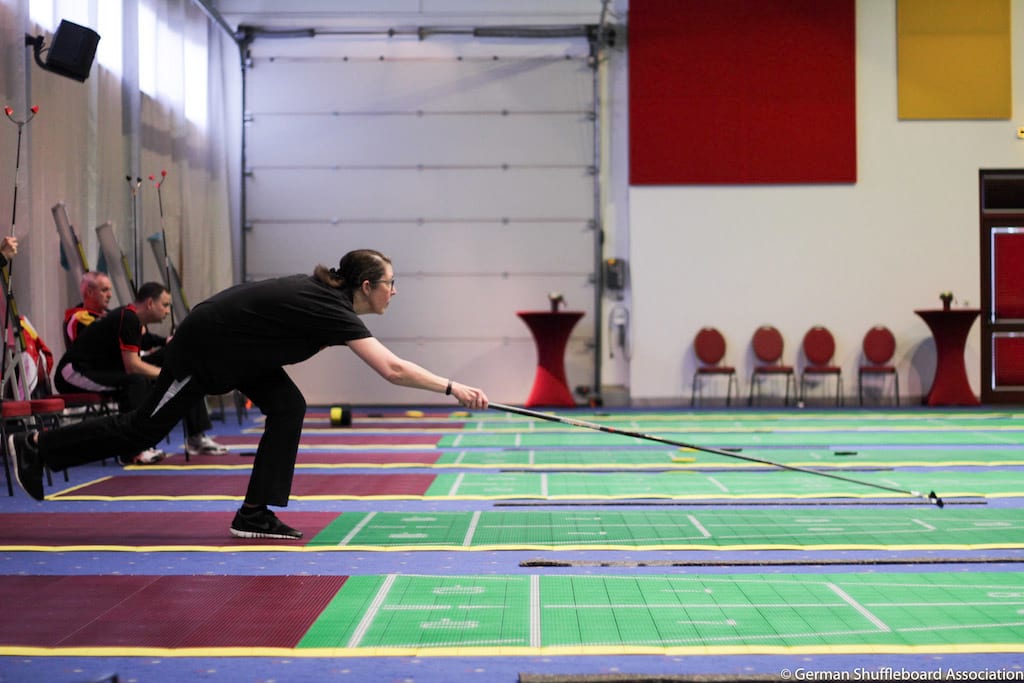
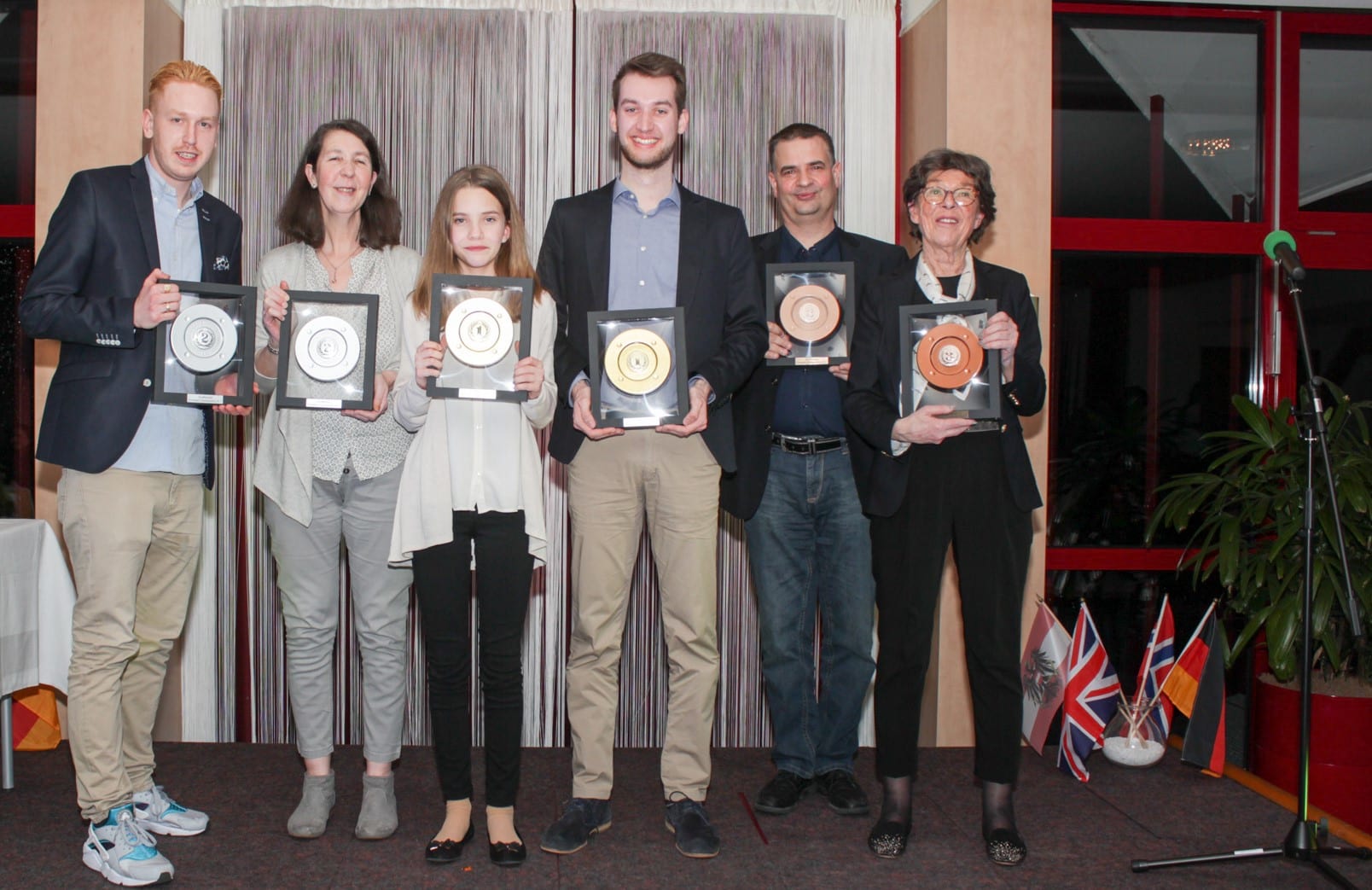

Great job to the germany team I looking to meet you in brazil for swc congratulations to the European teams my regards chaz todaro